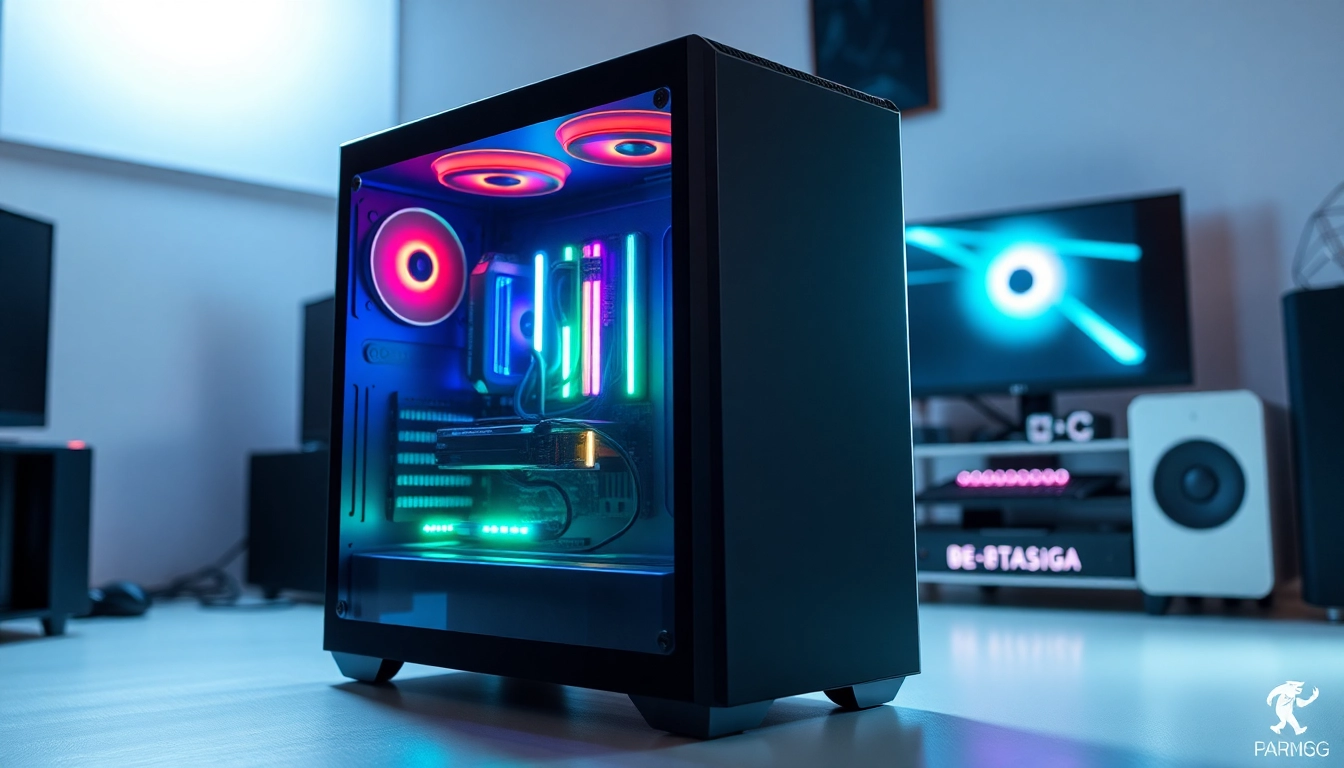Understanding Gaming PC Cases
In the dynamic world of gaming, every component plays a crucial role in delivering a seamless experience. Among these, the gaming pc case stands as an unsung hero. It’s not just a protective shell for your hardware; it significantly influences airflow, aesthetics, and overall performance of your build. Let’s delve deeper into what defines a gaming PC case and how it impacts your gaming setup.
What is a Gaming PC Case?
A gaming PC case, also known as a chassis or enclosure, is primarily designed to house and protect the internal components of a personal computer optimized for gaming. These components typically include the motherboard, processor, RAM, graphics card, storage drives, and power supply. The design of modern gaming cases often incorporates features focused on cooling efficiency, aesthetic appeal, and user accessibility, catering to an audience that seeks both performance and style.
Importance of Proper Airflow in a Gaming PC Case
Cooling mechanisms are integral to maintaining optimal performance levels in a gaming PC. The case design directly affects airflow since heat generated by the components can lead to thermal throttling, ultimately resulting in decreased performance or even hardware failure. Effective airflow solutions in gaming cases involve a synergistic approach: intake fans bring in cooler air, while exhaust fans expel warm air. Some cases employ multiple vents and fans to ensure that all components, including CPUs and GPUs, remain within safe operating temperatures.
Key Materials Used in Gaming PC Case Design
Gaming PC cases are constructed from a variety of materials, each offering distinct benefits. The most common include:
- Steel: Known for its durability and cost-effectiveness, steel is frequently used for budget-friendly cases.
- Aluminum: Lightweight and more aesthetically pleasing, aluminum cases are often found in premium models.
- Tempered Glass: A popular choice for showcasing RGB lighting and internal components, tempered glass panels add visual appeal without sacrificing structural integrity.
- Plastic: Used extensively in budget cases, plastic components often reduce weight but may sacrifice durability.
Types of Gaming PC Cases
To accommodate different needs and preferences, gaming PC cases come in various shapes and sizes. Understanding these distinctions can help you choose the best case for your gaming rig.
Mid-Tower vs Full-Tower Gaming PC Cases
Mid-tower cases are the most common choice among gamers. They typically offer a good balance of size, expandability, and affordability, making them suitable for most builds. On the other hand, full-tower cases provide additional space, which is beneficial for advanced cooling systems and extensive hardware setups. Full-tower cases can accommodate larger motherboards, more storage drives, and even multiple graphics cards, making them ideal for high-performance gaming rigs.
Compact Cases for Space-Saving Solutions
For users with limited desk space or who prioritize portability, compact cases (like mini-tower and micro-ATX cases) can be an excellent choice. Despite their smaller size, many modern compact cases efficiently manage airflow and can still support powerful components. They are designed to maximize space without compromising on style or performance, and some models are specifically engineered to be lightweight for easy transportation to LAN parties or gaming events.
Customizable Cases for Unique Builds
Customization is another appealing aspect of gaming PC cases. Many companies offer cases with modular designs that allow users to swap out panels or rearrange the internal layout. This versatility caters to hobbyists and enthusiasts who wish to personalize their builds. Some cases come pre-equipped with RGB lighting, while others allow for extensive modding, enabling users to create a truly one-of-a-kind setup.
Features to Look For in a Gaming PC Case
When selecting a gaming PC case, several critical features must be considered to ensure that it meets both practical and aesthetic needs.
Cooling Solutions: Fans and Radiators
A significant feature of gaming PC cases is their cooling solutions. A well-ventilated case will include options for multiple fan mounts, as well as support for radiators. Higher-end gamers may choose cases that allow the installation of water cooling systems, which can be more efficient than traditional air cooling. An ideal case would have the capability to add different sizes of fans, optimizing temperature management.
Easy Cable Management in Gaming PC Cases
Good cable management not only enhances the overall look of your gaming rig but also improves airflow and cooling efficiency. Cases designed with cable routing holes, Velcro ties, and removable cable management covers facilitate a clean installation, allowing users to easily organize and hide excess cables. This feature is especially important in setups with intricate hardware or RGB lighting, where visible cables can detract from the visual appeal.
Compatibility with Motherboards and GPUs
Before settling on a gaming PC case, it is essential to ensure compatibility with the anticipated hardware. Cases vary in size and shape, with support for ATX, micro-ATX, and mini-ITX motherboards. Additionally, ensure the case can accommodate the length and height of GPU models, as high-end graphics cards can be considerably larger than their entry-level counterparts. A case that lacks compatibility can hinder performance or force users to compromise on essential components.
Popular Brands and Models of Gaming PC Cases
With a plethora of manufacturers in the market, choosing the right gaming PC case can be overwhelming. Here is a look at some popular brands and models that have garnered positive acclaim from gamers.
Review of Corsair Gaming PC Cases
Corsair is a well-regarded name in the realm of gaming gear, renowned for its high-quality, innovative gaming PC cases. Models like the Corsair 4000D Airflow offer superior cooling capabilities with ample room for cables and accessories. On the other hand, models such as the Corsair iCUE 4000X RGB feature built-in RGB lighting options, allowing for a stunning visual aesthetic alongside functional design.
Best Budget Options for Gaming PC Cases
For gamers on a budget, choices abound. The NZXT H510 is a highly regarded mid-tower case that offers excellent airflow, modular cable management, and an attractive design without breaking the bank. Similarly, the Thermaltake Versa H15 is another good option, known for its solid build quality and reasonable pricing, making it a favorite among first-time builders.
High-End Gaming PC Cases You’ll Love
For those seeking premium builds, high-end cases often come equipped with advanced features and sleek designs. The Lian Li PC-O11 Dynamic is renowned for its spaciousness and custom liquid cooling capabilities, providing users with both aesthetic appeal and functionality. Similarly, the Fractal Design Meshify C stands out with its sleek, modern design and excellent airflow management, perfect for showcasing your components.
Building and Upgrading: Tips for Your Gaming PC Case
Successfully building, upgrading, and maintaining a gaming PC case involves multiple considerations that can significantly influence the performance and longevity of your setup. Here are some best practices.
Step-by-Step Guide to Building a Gaming PC
Building a gaming PC can seem daunting to newcomers, but by following a systematic approach, it can be an enjoyable process. Start by selecting the right gaming case, ensuring it fits your components. Next, properly install the power supply in the case, then mount the motherboard, ensuring tight connections for the CPU and RAM. After that, install the GPU and any additional drives, reinforcing cabling management to maintain airflow. Finally, connect all necessary power and data cables, and ensure fans are positioned correctly for optimal airflow.
Upgrading Components: What to Consider
When considering upgrades, always evaluate compatibility with your existing gaming PC case. For example, if you plan to upgrade your GPU, confirm that your case has enough clearance for installation. Similarly, ensure your cooling solutions are adequate to handle the thermal output of new components. By planning upgrades carefully, you can keep your system performing at peak levels while extending its lifespan.
Maintenance Tips for Long-lasting Gaming PC Cases
Regular maintenance of your gaming PC case can prolong its life and enhance performance. Dust accumulation can hinder airflow and lead to overheating, so it’s essential to clean the intake and exhaust areas periodically. Additionally, check for loose connections and reapply thermal paste if necessary to ensure optimal thermal conductivity between the CPU/GPU and heatsinks. These small maintenance tasks can significantly impact performance over time.
In conclusion, selecting the right gaming PC case goes beyond aesthetics; it plays an integral role in your gaming experience. By understanding the importance of airflow, material selection, and appropriate features, as well as recognizing the different types of cases available, you can make an informed choice. With a plethora of options from the market’s leading brands, there’s something available to suit every gamer’s needs. With the right case in mind, building and upgrading your gaming rig can lead to countless hours of seamless gaming enjoyment.



